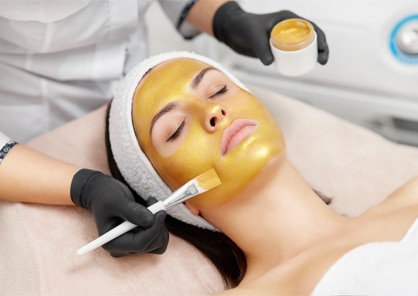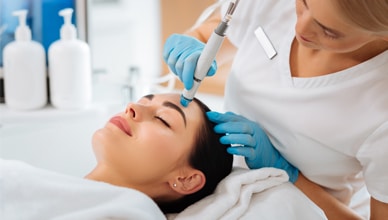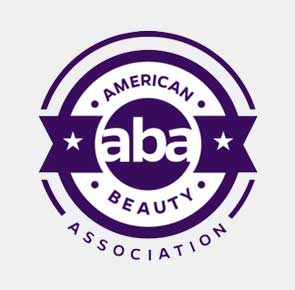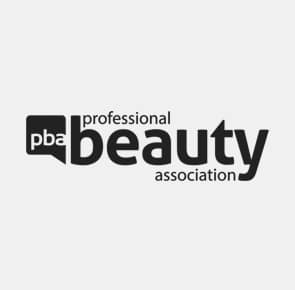Get Matched With Cosmetology Schools
What Does a Cosmetology Career Entail?
Although you may think of haircuts when you hear the term ‘cosmetology’, the word actually encompasses a wide range of personal care services. Basically, anything that has to do with hair, nails, makeup, and skin falls under the cosmetology category; tattoos are the exception.
Although cosmetologists must be licensed in every state it is one of the few licensed occupational categories that don't require a degree. That means you can enter the field of cosmetology after completing a short certification program and you can apply for a license as soon as you complete the other requirements as set by your state.
While no degree is required to enter the field of cosmetology, many in the field eventually become self-employed, so it may be wise to begin your career with a certification program that will count towards a future business or entrepreneurial degree.
Compare Popular Online Programs

Components of a Successful Cosmetology Career
There's a lot more to a successful career in cosmetology than cutting hair or painting nails. Although you'll be able to work under supervision once you pass your certificate program, you'll have to pass the state requirements and an exam before you can work on your own.
A career in cosmetology isn't as easy as it may sound. You'll spend long hours standing, which can be quite taxing. You'll also be exposed to many chemicals, so skin protection will be worn much of the day. You'll need great interpersonal skills to deal with all types of customers, too.
Besides the specific courses that will teach you how to cut and style hair or do nails, you'll need to learn basic salon office skills like scheduling and billing. If your long-term plans are to own your own salon or spa, you'll need to learn basic business practices in order to become a successful entrepreneur.
How to Become a Cosmetologist
Although you might think you can enroll in the nearest technical school to become a cosmetologist, you should do some homework before you commit to a school. Make sure the school has the classes for the area you plan to work in and that the school has the proper credentials so your education will be accepted by the state board.
Each state has different requirements for licensure. You'll most likely need to be 16 or older, hold a GED or high school diploma, and complete a board-approved cosmetology program in order to qualify for licensure. That means you can conceivably attend a trade or technical school while still in high school and get a head start on your career before graduation.
Your certificate program will include on the job training, so make sure this training counts towards any state work-hours requirement. Many state certification boards also require you have a high moral character so if you've had any brushes with the law make sure this fact won't affect your choice of careers.
Find Your Cosmetology Program
What Does A Cosmetologist Do?

Cosmetologists might work in nail salons, hair salons, spas, barber shops, or resorts as well as private facilities such as assisted living communities. They may work for an employer, rent "chair space" from an established salon or own their business outright.
Besides their special area of work, a cosmetologist mush be adept at understanding what a customer wants, making small talk, and running the business portion such as scheduling appointments and accepting payments. If you have your own business, you'll also need to know basic bookkeeping, employee scheduling, and similar chores associated with running a business.
What is the Difference between Beauty Schools and Cosmetology Schools?
Cosmetology schools usually offer one or more limited certification programs, and these are often offered in a technical school setting. The programs are designed to allow the student to enter the workforce quickly, usually in under a year.
Beauty schools are more detailed and offer more programs. Laser training, salon management, massage therapy, and fashion design are examples of specialized training you might find at a beauty school. Although beauty schools usually offer some of the same short programs found at cosmetology schools they also offer programs that take as long as two years to complete.
Typical Cosmetology Trade School Requirements
Cosmetology school requirements vary from state to state; most have a minimum age requirement of 16. You may also be required to have a high school diploma or GED, but some states accept an entrance exam. The lower age requirement allows some students to take classes while still in high school so you should check with your state board regulations before you enroll.
Typical Cosmetology Certifications Needed

As mentioned above, each state requirement for certification is different. A standard example would be 16 years of age, GED or diploma, and completion of a board-approved program. You may also be required to have completed a specific number of on-the-job training hours in order to qualify.
Once you meet the requirements you can sit for the licensing exam. This may be written, practical, or both. Typical written exam topics might be salon sanitation, state laws, and chemical usage. A practical exam might be styling a mannequin to specific directions.
Your license must be renewed periodically. Although there isn't any continuing education requirement it's a good plan to stay informed on new developments that pertain to your field.
Academic Standards for a Cosmetology Degree/Certification
Your academic standards will depend on your school of choice but it's a good plan to set your goals high. By maintaining a grade point average (GPA) of 3.0 or higher you will qualify for more types of financial aid. In addition, a higher GPA will assure acceptance into a college if and when you decide to continue your education.
Exam/Experience Needed for a Cosmetology Degree/Certification
As mentioned before, each state has different exam and experience requirements in order to qualify to sit for the state board exam. A typical example of required experience is 1,500 total hours, which includes the class time of the program, program work hours, and apprenticeship after graduation.
Specialized programs typically have additional requirements. For example, a nail technician would need additional hours in the field of nails and cosmetology teachers are required to have additional work hours completed.
Cosmetology Degree & Certification Options
As mentioned above a certificate program is an excellent way to enter the field of cosmetology as you can enter the workforce in under a year. That being said, it is a limited program and won't teach you advanced techniques or specialized skills. A certificate program is designed more for entry into the barbering, hair styling, or nail technician field. If you want to learn specialized areas such as braiding, theatrical makeup, or hair design you might continue at a beauty school that offers special programs in your area of interest.
An associate degree program typically combines the basics of cosmetology with beginning business courses. If you eventually plan to open your own salon or spa or otherwise work independently this may be your best choice, as you will get a solid understanding of best business practices while also completing the coursework required for your state licensure.
A third option is to take an associate degree program followed by one or more specializations at a beauty school. This will allow you to become licensed, open your own business, and then focus on your preferred area of cosmetology. According to the Bureau of Labor Statistics (BLS) over 70% of barbers and over 40% of hair stylists are self-employed so it's a good idea to take your long-term plans into consideration before enrolling in a program.
Find Online Cosmetology Schools
Cosmetology Trade School Fields of Study
Trade school programs are short and designed to get you started with the basics of your profession. Here are the primary areas of training for cosmetology trade school programs:
- Barber: cut and style primarily men's hair; learn to shave as well as trim beards and mustaches. Barbers learn to cut shorter, more traditional hair styles but may also offer coloring and perm services.
- Hair stylist: focus is on longer hair styles; may use a diverse range of styling products to achieve a certain style; Usually stay up to date on the latest styles and trends; may recommend certain products for skin and hair.
- Nail technician: also called a manicurist or pedicurist, a nail technician cleans, trims, and files nails for both men and women, and usually offers polish and products such as acrylic nails.
Additional training in a special area may be attained at a beauty school after you've finished your cosmetology certificate program. You might decide to specialize in one or more of the following areas, or many other personal care specialties:
Some beauty schools offer additional programs in related areas, such as:
- Massage therapy
- Fashion design
- Laser treatments
- Salon management
- Teacher training
- Nail airbrushing and art
- Makeup artist
Here are some sample courses you might take in your cosmetology certificate program:
- Beauty Culture Lab
- Beauty Culture Theory
- Cosmetology Career Planning
- Fundamentals of Hair Color
- Salon Business
- Salon Management and Marketing
- Work Ethics
Here are some sample courses you might take in an Associate's program, in addition to the certificate courses above:
- Accounting Principles
- Business Mathematics
- First Aid
- Leadership Development
- Marketing Fundamentals
- Psychology
- Chemistry
Associates & Certification Cost with Range for Each
| Program | Public School | Private School |
|---|---|---|
| Certificate | $5,000 to $5,500 | $9,000 to $12,600 |
| Associate's | $5,700 to $12,200 | $20,000 to $26,000 |
Potential Careers & Salaries for Cosmetology Graduates
A certificate program is an excellent choice when you want to enter the workforce as soon as possible because you can learn all the basics in 9-12 months and be ready to work. An Associate's program or specialized beauty school program will allow you to advance in your chosen field and focus on management or ownership of your own salon or spa or a special niche within the field of cosmetology. Here's a look at some average salaries in several careers within cosmetology, with the entry level being those with the least education and experience and the late career range being those with the most experience and education. Note that these numbers do not necessarily include tips and bonuses, which are often a large part of income in the field of cosmetology:
Cosmetology Salaries by Occupation
Annual Median Salary by Occupation
| Occupation | Entry-Level Salary Range | Mid-Career Salary Range | Late-Career Salary Range |
|---|---|---|---|
| Barber | $26,000 | $30,900 | $44,200 |
| Hair dresser | $28,800 | $35,800 | $48,000 |
| Makeup Artist | $40,700 | $50,000 | $60,000 |
| Nail technician | $19,600 | $32,000 | $25,300 |
| Manicurists and pedicurists | $23,000 | $26,500 | $32,500 |
| Salon management | $39,305 | $39,700 | $45,000 |
| Cosmetology Instructor | $38,000 | $40,400 | $40,900 |
Important Questions to Ask (FAQ)
How long does it take to earn a Cosmetology Degree or Certification?
A technical or trade school cosmetology program usually lasts from 9-11 months to earn a certificate. A specialized program in a beauty school can take from nine months to two years, and an associate's degree usually takes two years of full-time attendance to complete.
Because an apprenticeship and on-the-job training is a big part of your cosmetology training you may find employment while finishing your education and fulfill your work hour requirements at the same time. Many students opt for a technical certificate program in order to enter the workforce faster. Once established in a job, they then attend college part time to earn their Associate's degree with the goal of attaining the business training needed to open their own salon or spa in the future.
How much does a Cosmetology Trade School Certificate Program Cost?
The total cost of your program can vary widely depending on several factors. The length of the program, location of the school, and number of required courses can all affect the program cost. A trade school or technical school cosmetology certificate program cost ranges from $5,000 to $15,000 and a beauty school from $10,000 to $20,000; supplies and textbooks will add another $2,000 or more to the tuition total. An associate's degree typically ranges from $7,000 to $29,000.
Much or all of the costs can be covered by financial aid such as grants and scholarships, so it is important to follow through on any financial aid information offered by your school of choice before enrolling.
How many students graduate “on time,” in 12 months or 24 months?

What kind of accreditation does the program hold? How is it regarded in the field?
This is a vital question because your state licensure as well as financial aid can depend on the school accreditation. Look for the state board licensing accreditation requirement as well as the accreditation accepted by the federal aid website before you enroll..
Software, Technology & Skills Needed
You might not expect software and technology to be needed by a cosmetologist, but the opposite is true. For school you'll need a basic understanding of computers as well as a word processing program. Once enrolled, you'll learn to use one or more salon productivity programs designed to help you manage client scheduling, point of sale interactions, and promotional offers.
If you plan to go into business for yourself you'll need management software and a basic bookkeeping program; it's also a good idea to learn a social media management program to utilize your online time effectively.
Cosmetology Trade School Scholarships
-
Sydell & Arnold Miller Family Art of Hairdressing Student Scholarship
Amount: $5,000
Deadline: February 28, 2021, July 31
offers one scholarship of $5,000 to new or current students of an accredited beauty school or program. Must submit a video showing three examples of student's styling skills and a creative description of student's vision for hairdressing.
-
Beauty Changes Lives Scholarships
Amount: $5,000
Deadline: February 10, July 31
One $5,000 scholarship is awarded based on student's three favorite haircuts as well as their creative vision for cutting hair.
-
Alice Madden Barton Scholarship Program
Amount: Varies
Deadline: June 30, December 31
Sponsored by Great Clips, this scholarship is available to all high school graduates interested in cosmetology or barbering as a career. Awards are given twice a year, in January and July.
Professional Cosmetology Trade School Organizations
- ABA
- PBA
- ACSP

ABA
American Beauty Association
offers master training courses, national discounts, wholesale product pricing,

PBA
Professional Beauty Association
industry trends and news, scholarships, insurance, industry show discounts, free magazine subscriptions, and education discounts for all members.

ACSP
Association of Cosmetology Salon Professionals
offers members community outreach opportunities, networking, leadership and mentoring opportunities as well as insurance discounts, legal plans, and identity theft insurance.
Choosing an Accredited School
Once you narrow your choices check each school for accreditation. Verify they are accepted by the state board that licenses cosmetology as well as regional or national accreditation as accepted for federal aid and scholarships.
Choose the type of classes that will work best for your personal lifestyle. While much of cosmetology school is hand-on and must be done on campus many schools offer some online courses as an alternative to traveling to campus and adhering to a strict class schedule.
Does the Vocational School Have Post-Graduate Job Placement Assistance?
An established school will offer job placements to graduates, and this is vital to cosmetology students because most states require work experience in addition to completion of the coursework. If you can't find the information on the school website don't hesitate to ask and get a definitive answer before you enroll.
Why You Need to Consider the Overall National Rankings of the School and the Effects on Your Career or Salary
A school is only as good as it's reputation, so make sure your school of choice is well regarded by the industry. Graduation from a less reputable school may mean you have to accept a lower salary. If your prospective employer recognizes and respects your school, it will give you a solid foundation on which to build your career in cosmetology.
